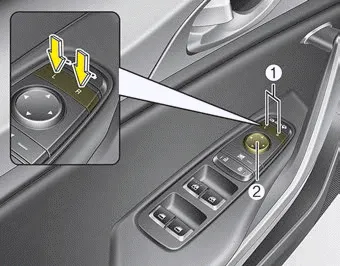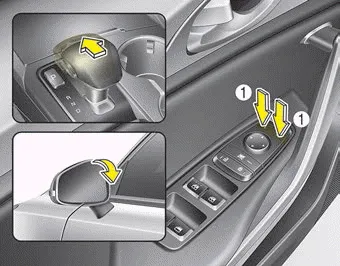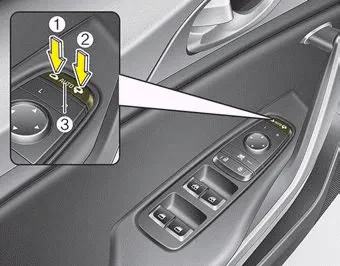Kia Stinger CK: Mirrors / Outside rearview mirror
Contents:
Be sure to adjust the mirror angles before driving.
Your vehicle is equipped with both left-hand and right-hand outside rearview mirrors. The mirrors can be adjusted remotely with the remote switch. The mirror heads can be folded back to prevent damage during an automatic vehicle wash or when passing through a narrow street.
The right outside rearview mirror is convex. Objects seen in the mirror are closer than they appear.
Use your interior rearview mirror or direct observation to determine the actual distance of following vehicles when changing lanes.
CAUTION - Rearview mirror
Do not scrape ice off the mirror face; this may damage the surface of the glass. If ice should restrict the movement of the mirror, do not force the mirror for adjustment.To remove ice, use a deicer spray, a sponge or soft cloth with very warm water.
If the mirror is jammed with ice, do not adjust the mirror by force. Use an approved spray de-icer (not radiator antifreeze) to release the frozen mechanism or move the vehicle to a warm place and allow the ice to melt.
WARNING - Mirror adjustment
Do not adjust or fold the outside rearview mirrors while the vehicle is moving. This could result in loss of control.
Adjusting outside rearview mirror

The electric remote control mirror switch allows you to adjust the position of the left and right outside rearview mirrors. To adjust the position of either mirror, press the R or L button (1) to select the right side mirror or the left side mirror, then press a corresponding point (▲) on the mirror adjustment control to position the selected mirror up, down, left or right.
After adjustment, press the R or L button again to prevent the inadvertent adjustment.
CAUTION - Outside mirror
- The mirrors stop moving when they reach the maximum adjusting angles, but the motor continues to operate while the switch is pressed. Do not press the switch longer than necessary, the motor may be damaged.
- Do not attempt to adjust the outside rearview mirror by hand. Doing so may damage the parts.
Reverse parking aid function

While the vehicle is moving in reverse, the outside rearview mirror( s) will move downward to aid reverse parking. According to the position of the outside rearview mirror switch (1), the outside rearview mirror(s) will operate as follows:
L/R : When the remote control outside rearview mirror switch (1) is selected to the L (left) or R (right) position, both outside rearview mirrors will move downward.
Neutral : When the remote control outside rearview mirror switch is placed in the middle position, the outside rearview mirrors will not operate while the vehicle is moving rearward.
The outside rearview mirrors will automatically revert to their original positions under the following conditions:
1. The Engine Start/Stop button is in the OFF position.
2. Shift lever is moved to any position except R (Reverse).
3. Remote control outside rearview mirror switch is placed in the middle position.
Folding the outside rearview mirror

Electric type
The outside rearview mirror can be folded or unfolded by pressing the switch as below.
Left (1) : The mirror will unfold.
Right (2) : The mirror will fold.
Center (AUTO, 3) :
The mirror will fold or unfold automatically as follows:
- The mirror will fold or unfold when the door is locked or unlocked by the smart key.
- The mirror will fold or unfold when the door is locked or unlocked by the button on the outside door handle.
- The mirror will unfold when you approach the vehicle (all doors closed and locked) with a smart key in possession.
CAUTION - Electric type outside rearview mirror
The electric type outside rearview mirror operates even though the engine start/stop button is in the OFF position.However, to prevent unnecessary battery discharge, do not adjust the mirrors longer than necessary while the engine is not running.
Do not fold the electric type outside rearview mirror by hand.This could cause motor failure.
Other information:
Kia Stinger (CK) 2018-2023 Owner's Manual: 35R Clutch Control Solenoid Valve (35R/C_VFS)
Specifications Specifications Item Specification Control type N/H (Normal High) Control pressure kpa (kgf/cm², psi) 0 - 1,569.06 (0 - 16, 0 - 227.57) Current (mA) 0 - 1,100 Coil resistance (Ω) 5.Repair procedures Replacement 1. Disconnect the negative (-) battery terminal. 2. After loosening the nuts and bolts, remove the main crash pad and cowl cross bar assembly altogether. (Refer to Heater - "Heater Unit") 3. Remove the heater core (A). 4.Categories
- Manuals Home
- Kia Stinger Owners Manual
- Kia Stinger Service Manual
- New on site
- Most important about car


